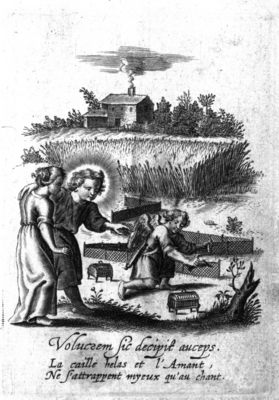Ludovicus van Leuven, Amoris divini et humani antipathia (1629)
Table of contents ↑Aucupium Amoris [16]

XVI.
Chrysost.
O Anima! in media laqueorum ambulas: la
queus superbia; laqueus cupiditas; laqueus
auaritia; laqueus diuitiæ; laqueus luxuria; laqueus
voluptates; laqueus honores: qua de causa tot la-
quei? ne deorsum volites sed superiora quaras:
etenim volatilia donec in altum aëra secant, non
facilè capiuntur: ita tu donec ad superiora respe-
xeris, nec laqueo, nec vllis alijs facilè capieris in-
sidijs. Venator est Amor mundi: fias igitur illius
calamis sublimior, in altum ascendens, non am-
plius vllam rerum humanarum admiraberis: sed
sicuti postquam in montium verticem ascenderi-
mus, parua nobis & vrbs, & mœnia esse videntur,
& formicarum more nobis viri super terram ire
cernuntur; sic postquam supra celsam Prophetæ
cogitationem ascenderis, nihil te terrenorum per-
cellere poterit, sed parua videbuntur omnia, &
diuitiæ, & honores, & potentia & gloria. illud
continuo ratiocinemur; sicut articulæ laqueo cap-
tæ vtilitas nulla, sed frustra & in cassum alas con-
cutit: ita tibi nulla rationum vtilitas, si ab impro-
bâ penitus cupiditate capta sis sed quantum-
cumque resilieris, capta es. ideo alæ sunt auiculis
vt fugiant laqueos; propterea rationes homini-
bus vt peccata fugiant. quam igitur veniam ha-
bebimus? quam vero defensionem, cùm auiculis
simus dementiores? auicula namque semel capta,
laqueo mox elapsa, eodem iterum difficile capie-
tur; nam cuique fit experientia cautelæ magistra,
nos sæpius eisdem capti, in eadem cadimus.
O Anima! in media laqueorum ambulas: la
queus superbia; laqueus cupiditas; laqueus
auaritia; laqueus diuitiæ; laqueus luxuria; laqueus
voluptates; laqueus honores: qua de causa tot la-
quei? ne deorsum volites sed superiora quaras:
etenim volatilia donec in altum aëra secant, non
facilè capiuntur: ita tu donec ad superiora respe-
xeris, nec laqueo, nec vllis alijs facilè capieris in-
sidijs. Venator est Amor mundi: fias igitur illius
calamis sublimior, in altum ascendens, non am-
plius vllam rerum humanarum admiraberis: sed
sicuti postquam in montium verticem ascenderi-
mus, parua nobis & vrbs, & mœnia esse videntur,
& formicarum more nobis viri super terram ire
cernuntur; sic postquam supra celsam Prophetæ
cogitationem ascenderis, nihil te terrenorum per-
cellere poterit, sed parua videbuntur omnia, &
diuitiæ, & honores, & potentia & gloria. illud
continuo ratiocinemur; sicut articulæ laqueo cap-
tæ vtilitas nulla, sed frustra & in cassum alas con-
cutit: ita tibi nulla rationum vtilitas, si ab impro-
bâ penitus cupiditate capta sis sed quantum-
cumque resilieris, capta es. ideo alæ sunt auiculis
vt fugiant laqueos; propterea rationes homini-
bus vt peccata fugiant. quam igitur veniam ha-
bebimus? quam vero defensionem, cùm auiculis
simus dementiores? auicula namque semel capta,
laqueo mox elapsa, eodem iterum difficile capie-
tur; nam cuique fit experientia cautelæ magistra,
nos sæpius eisdem capti, in eadem cadimus.

Oiselerie de l'Amour.
XVI.
Ame si tu n'estois, ladre, insensible, & lourde,
Dis moy, voyant cecy, ne serois tu pas sourde,
Aux appels de l'Amour, & à ses faux sifflets?
Ame ie t'aduertis, Ame ie te conseille,
De leur fermer les yeux, de leur boucher l'aureille,
Ou tu te verras tost prinse dans ses fillets.
XVI.
Ame si tu n'estois, ladre, insensible, & lourde,
Dis moy, voyant cecy, ne serois tu pas sourde,
Aux appels de l'Amour, & à ses faux sifflets?
Ame ie t'aduertis, Ame ie te conseille,
De leur fermer les yeux, de leur boucher l'aureille,
Ou tu te verras tost prinse dans ses fillets.
Translations
 |
The fowling of love. |
 |
This is how the fowler catches the bird. |
Sources and parallels
-
Porteman 1975, p. 211. Similar with: Cats, Maechden-plicht
 , embl. 14
, embl. 14
-
Same copperplate, slightly altered, in: Vleyen vermag veel in de liefde [17]
 (in: Willem den Elger, Zinne-beelden der liefde (1703)
(in: Willem den Elger, Zinne-beelden der liefde (1703) )
[Compare
)
[Compare ]
]
References, across this site, to this page:
- Vleyen vermag veel in de liefde [17]
 (in: Willem den Elger, Zinne-beelden der liefde (1703)
(in: Willem den Elger, Zinne-beelden der liefde (1703) )
)

